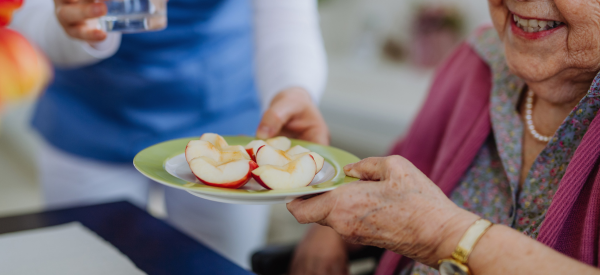Have you had too many nights when you are awake at 3 a.m., staring at your ceiling fan? Well, you’re not alone. Nearly 30% of the population has some form of insomnia. But don’t pop a sleeping pill just yet. Here are some suggestions to help you get a full, restful night of sleep. 1. Catch a catnap. Are you afraid that if you nap during the day you will have a harder time falling asleep that night? Not so, say sleep specialists. Taking a 20-40 minute nap during the day will make you ready for sleep come nighttime. However, a nap longer than 40 minutes will have
Read More
Archives for Healthy Living
Food for Thought…and Memory
Many seniors are reading and doing crossword puzzles to fight off Alzheimer’s disease. But is it enough? A recent study showed links to healthy behaviors and good memory, no matter the age of the participant. This study, done via telephone survey by UCLA, examined how eating, exercising, and smoking affected memory. The first result was that healthy eating positively affected memory in all age groups. Although it clearly helped the younger participants, it was most dramatic among the seniors in the study. Those older participants who did not eat well were much more likely to report memory loss. Also, although
Read More
Fight the Risk of Dementia
The risk of dementia can be worrisome, not only for the senior but also for the family members caring for him or her. Although much of the research suggests that Alzheimer’s disease and other dementia may be out of our control, some studies are saying that there are ways to prevent the condition. Here are three ways to beat the odds of getting dementia: Work up a sweat. It has been found that the positive circulatory effects of light exercise can reduce the risk of dementia. Beginning a new exercise routine should be discussed with a medical provider first for
Read More
The Key to Longevity Revealed
Well, the key to longevity may finally be revealed. A 94 year old man tells an incredibly inspiring story about how he was able to stay active in his old age by simply exercise routinely. It seems none of us have an excuse anymore, at least when it comes to regular exercise. Recent studies have shown that regular exercise has an even bigger impact on longevity than weight does. You read that right. According to the research, someone who maintains an active lifestyle will live years longer than those who do not. And it seems to not matter if you
Read More
Senior Safety in Summertime
When you think of summer, thoughts of sunshine, swimming, and sitting on the porch with a cold ice tea in your hand may leap into your mind. You probably don’t think of the potential dangers related to summer. Summer weather, particularly in Illinois, really brings the heat. When we sweat, we lose precious water from our bodies causing dehydration if not replenished quickly. One of the early symptoms of dehydration is dizziness. If a senior is dehydrated and gets up too quickly, the resulting light-headedness can cause a dangerous fall. Keep in mind that if you feel thirsty, you are
Read More
Finding the Meaning of Life
What is the meaning of life? Everyone, from philosophers to theologians, has been asking this question for as long as humans have been in existence. Scientists are now taking a crack at it, and have come up with a few tips to help us find it. According to an article on Psych Central, the first step towards finding meaning is nature. People who are around nature often report having more meaning in their lives. Even just looking at pictures of nature can help. In one interesting study, groups were shown pictures of nature in the four seasons. People shown the seasons
Read More
Walking for a Sharper Mind
The weather’s getting warmer, the flowers are blooming, and the air is thick with the smell of spring. Do you need another good reason to go for a walk outside today? Well here’s another: research shows that staying physically active keeps us mentally sharp as we age. When we are strolling along, our heart pumps strongly and our blood vessels get essentially flushed with fresh blood. This keeps our circulatory system healthy, but it also has a great effect on your brain. There are many blood vessels in and around the brain, supplying the hungry nerve cells with oxygen and
Read More
Eat Green for Earth Day
Earth Day was this month, and it makes us think of ways that we can leave the world a little better for those who follow us. One way is by eating “green”. This doesn’t mean that you need to load up on green vegetables. (Although eating green leafy veggies is a great way to stay healthy!) It means to eat things that are grown in a way that benefits Mother Earth. Eating locally is a great way to help the environment. For example, imagine that you buy an apple at the supermarket down the street. Chances are that the apple
Read More
Snoozing May Lower Cancer Risk
Sleeping, snoozing, nodding off, getting shut-eye… However we say it, we need it. Sleep regenerates our bodies, helps us form memories, and tunes up neural connections. But now scientists are saying that catching plenty of zzz’s can also reduce our risk of cancer. order viagra no prescription When light levels are low, our tiny pineal gland releases a hormone called melatonin into our blood. This hormone makes us sleepy and helps us drift off. And when scientists evaluated the effects of melatonin on the body, they found that it did not only help someone to sleep, but high levels were
Read More
A Healthy Diet Makes for a Happier You
Eating well is important at any age, but becomes more so as we age. It seems that young adults can eat nearly anything without any consequence. But as the years go on, foods have more of an effect on a body. Eating well-balanced meals is important to avoid conditions such as type 2 diabetes and high blood pressure. Food is essentially energy that the cells in our body need to do their jobs. So we need to eat enough to give those cells the energy that they need. As we age and are not as physical, our cells don’t need
Read More



